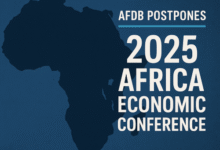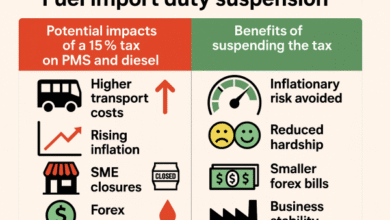NEWS
NAPTIP D-G tasks students on ‘smart’ migration

Fatima Waziri-Azi, Director-General, National Agency for the Prohibition of Trafficking in Persons (NAPTIP), has tasked Nigerian students proposing to travel out of the country to be smart about it.
The D-G gave the advice on Wednesday in Abuja at the sixth edition of the University of Abuja leadership series, held at the faculty of Social Science of the institution.
The programme was organised by the Tetfund Centre of excellence in public governance and leadership, University of Abuja.
Speaking on the topic “leadership in crisis, tackling the scourge of human trafficking in Nigeria”, the D-G said that human trafficking is a US$150 billion global industry, one of the most serious human rights violations.
She said that human trafficking is the world’s second most profitable criminal enterprise after drug trafficking and that the youth must be aware of this before they fall victim.
According to her, at the moment, men, women and children have been trafficked and exploited all over the world and human trafficking remains a crime that happens in plain sight.
The D-G said that the crime is far more prevalent, complex and close to home than most of the people realize and that there was the need for all and sundry to pay attention to it.
“Human trafficking may occur within a country or across borders, although accurate data is difficult to comply with because of the financial nature of the crime,” the international Labor organization estimated in 2016.
“ILO has said no fewer than 40.3 million victims are trapped in various forms of slavery across the globe, and 20 percent of victims have children, this is, however, an estimate, meaning these figures are higher.
“Take for instance in Nigeria, there are only four approved land borders land border control posts, however, there are over 1,900 illegal borders in the country. Imagine the hundreds of people who pass through these unmanned borders every day undetected.
“Human trafficking is driven by supply and demand, which is an enormous market. The demand is usually festered by the openness of society.
For instance, the prostitution and the supply side depend on socio-economic and socio-political factors, which enables this market to thrive,” she stressed.
Waziri-Azi disclosed that active statistics from 2019 to 2022 show that 61 percent of trafficking in Nigeria happens internally, that is, from one community to another and across state lines.
She said that 39 percent are trafficked outside the country’s borders and that means that the scourge is both internal and external, with a higher rate of internal trafficking.
She urged the students to report any suspected case of human trafficking and slavery, saying that the agency has offices in 29 states of the federation.
The D-G advised the students to possess leadership qualities in making informed decisions in every endeavour of their lives, adding that leadership is all about the boldness to say and do something.
She, however, called on the students to be mindful of who they associate with, as well as be mindful of whatever job offers in foreign countries come their way.











